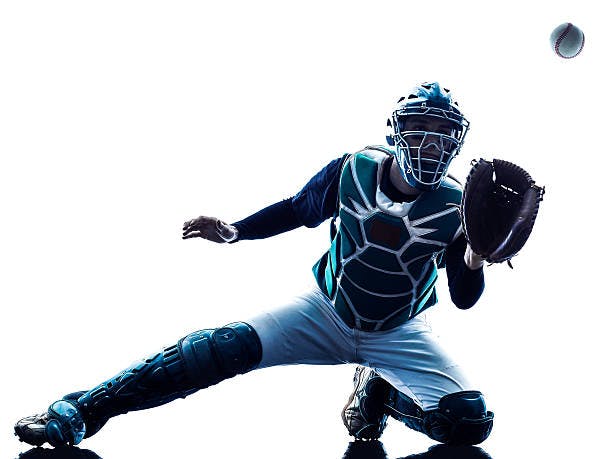
Catchers can influence pitchers...for bad or good
- By Drew Johnson
“Who's their catcher?” This is the first question many Major League pitchers ask when they are being traded. The pitcher-catcher relationship is critical to the success of a ball team, which means it’s vital to train your youth catchers the art of working with their pitchers.
Catching: The Art of Receiving with Jerry Weinstein Enter Ambassador Code 11586773 For all available discounts
Catchers are constantly thinking about the best way to get a batter out. Just like with pitchers, it is always an advantage if a catcher knows the scouting report on the batter or at least pays attention during each at-bat.
Noticing whether a player tends to hit for the fences or pull the ball to left field can make all the difference in a catcher’s performance at calling pitches.
In addition to having strong balance, agility, glove work, toughness, hand and foot speed, and strategic thinking, catchers need to have incredible interpersonal skills. When your catcher can properly communicate with your pitcher, your team can improve its success.
Tell the Pitcher What He Needs to Hear
Your catcher needs to know his pitcher. Without an understanding of the personality of the pitcher, the catcher will have a hard time knowing what to say. Many pitchers need their catchers to be soft and caring, while others want someone direct.
“He pitches better when he’s mad, so I try to make him that way,” Jorge Posada said about Orlando Hernandez, according to an ESPN article. Certainly, kids shouldn’t be mad on the field, but a little bee in the bonnet can cultivate that competitive spirit.
No matter a pitcher’s preference, they all need to know the truth.
A catcher shouldn’t tell a pitcher he is doing great when it’s clear he’s had much better days. Telling the pitcher the truth is essential, but most pitchers prefer when a catcher does so kindly. Rather than just saying “You need to work the inside of the plate,” catchers must tell the pitcher the way they execute better. Pitchers can often clearly see the areas where they are not effective, but they need to know what they should do to become better. Some kids have this down “naturally,” and others can gain this skill from an understanding parent who doesn’t coddle but suggests guidelines.
Treat Practice Like a Game
Rather than simply placing the glove in the strike zone and merely going through the motions during practice, a catcher can treat practice like the real game. Working all corners of the plate, as well as up and down, will have your pitcher familiar with the way you set up during a game.
Visiting the Pitcher
Paying a visit to the pitcher typically results in an effective partnership. Taking trips to the mound to talk to the pitcher and calm him down can help build his confidence. Effective catchers can make pitchers smile in tough situations, and this can relax them.
Communication Is Key, Too
Certainly, the pitcher-catcher relationship is critical to a team’s success. This makes it vital for coaches to train catcher in this art of social interaction. Certain catchers are simply on the same page as their pitchers, and these relationships often result in a low ERA. Ultimately, overall improved relationships on your team boost morale and improve performance.


No comments:
Post a Comment